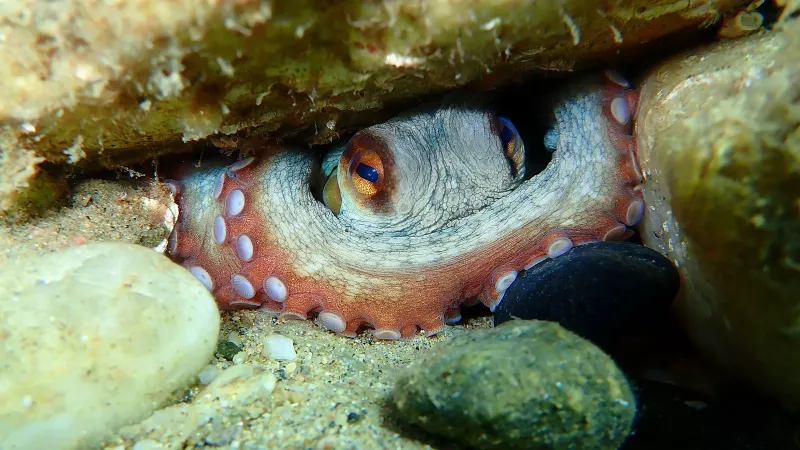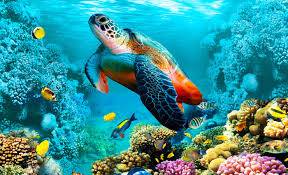Octopuses are problem-solvers, mischief-makers and notorious escape artists. They also appear to have a rich inner life – so what is it like to be an octopus?
It was a big night for Inky the octopus. The day's visitors had been and gone, and now his room in the aquarium was deserted. In a rare oversight, the lid of his tank had been left ajar. The common New Zealand octopus had been without female company for some time, sharing a tank with only a fellow male, Blotchy. The loose lid provided Inky with an opportunity. With eight strong suckered limbs and, quite possibly, intimate concerns on his mind, Inky hauled himself out of the water, made his way under the loose lid, and off across the aquarium floor.
He made it about 13ft (4m) when he found something else – not a mate, but a drain that emptied into the Pacific Ocean. With that, Inky was gone.
Read Also: Aribo explains what it felt like to score for Rangers in Europa League final
(No one, besides Blotchy, was there to witness this great escape. But with the help of a wet trail and a few telling sucker marks, Inky's movements were later pieced together by the staff of the New Zealand National Aquarium in the city of Napier.)
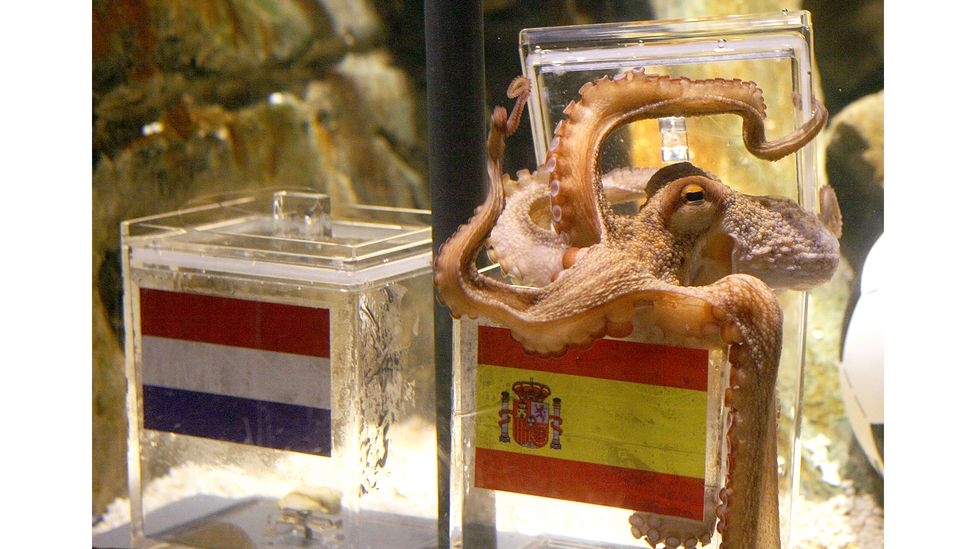
As Inky demonstrated in his famous escapade, octopuses are enterprising animals adept at problem solving. They are acutely intelligent and able to learn novel tasks and orient themselves within their environment. There is also growing consensus that octopuses are most likely sentient.
People who work with octopuses or who spend a lot of time in their company describe the sense that when you look at an octopus, there is something looking back.
"When you're dealing with an octopus who's being attentively curious about something, it is very hard to imagine that there's nothing experienced by it," says Peter Godfrey-Smith, professor of history and philosophy of science at the University of Sydney in Australia, and author of Other Minds: The Octopus and the Evolution of Intelligent Life. "It seems kind of irresistible. That itself is not evidence, that's just an impression."
Given this hunch as a starting point, how do you begin to explore the consciousness of an animal so unlike ourselves?
To start with, what do philosophers and scientists mean by "consciousness" in this context? Godfrey-Smith takes it as meaning there is "something it is like to be that animal". In a famous essay, the philosopher Thomas Nagel asks "What is it like to be a bat?" Nagel described the problem that imagining the inner experience of a bat is very difficult, if not impossible, when your reference point is the human body and your own human mind.
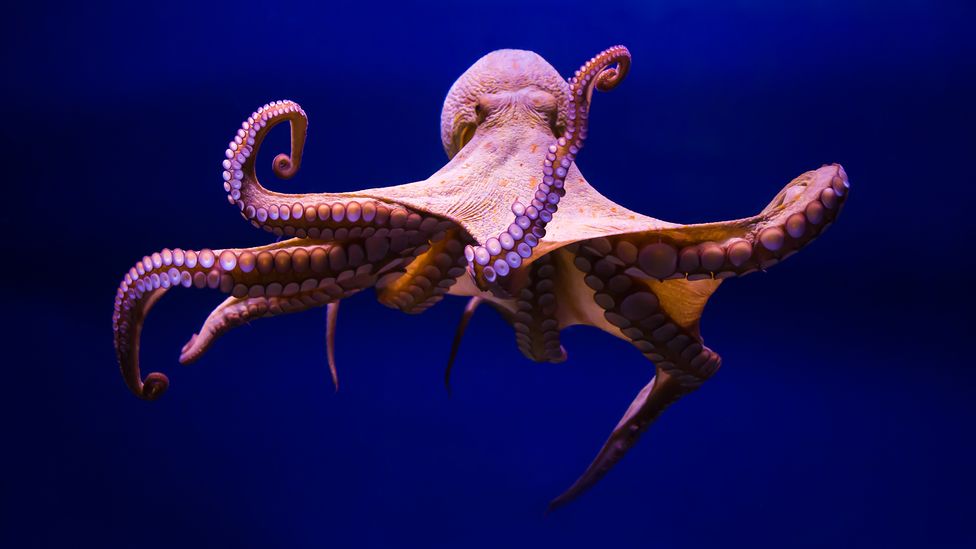
Likewise, imagining an octopus's inner life is a hard thing to do from our human standpoint. Try it for a moment – imagine what it's like to be suspended in the cool blueish twilight down at the seabed, perhaps a slight drag of current pulling you this way and that, your eight arms waving gently around you. When you picture the tips of your suckered limbs moving, what do you imagine it feels like? Is it, perhaps, something like wiggling your human fingers and toes?
In the case of the octopus, people sometimes ask whether there might be multiple selves present – Peter Godfrey-Smith
Now add into the equation that an octopus is an invertebrate, with no skeleton at all. Its legs have no femur, tibia or fibula, no feet and no toes to wiggle. Instead, octopuses have a hydrostatic skeleton, combining muscular contraction and water's resistance to compression to generate movement. This is very different from your own experience of moving your extremities – a little closer might be when we move our tongues, which also make use of hydrostatic pressure. Indeed, the octopus's limbs are covered in suckers that have unique sensors that taste everything they touch.
"The octopus's arms are, in some ways, more like lips or tongues than hands," says Godfrey-Smith. "There's a whole great cascade of sensory information of that taste-based form that's coming in every time the animal does anything. That's very different from our situation."
Take a closer look at the octopus's nervous system, and things get even stranger. The octopus's arms have more autonomy than our human arms and legs do. Each has its own miniature brain, giving it a degree of independence from the animal's central brain. Our own nervous system, however, is highly centralized, with the brain the seat of sensory integration, emotion, initiating movement, behavior and other actions.
"One of the real challenges we have is to try to work out what experience might be like in a less centralized, less integrated kind of system," says Godfrey-Smith. "In the case of the octopus, people sometimes ask whether there might be multiple selves present. I think it's just one self per octopus, but there might be a kind of partial fragmentation, or just a sort of looseness there."
The closer you look at the octopus's body and nervous system, the harder it becomes to grasp – or believe you are grasping – what it might be like to be an octopus. After all, the last common ancestor we shared with octopuses lived 600 million years ago (an uninspiring-looking animal something like a flatworm).
The mind of an octopus may be highly different from our own, but it is only by trying to see the world from their point of view that we will be able to find out what is good for them – Heather Browning
However hard it might be to do, it's worth trying to understand whether octopuses have consciousness, and what it's like if they do, says Godfrey-Smith. "We've just got to think about it, work through it and try to put together a picture."
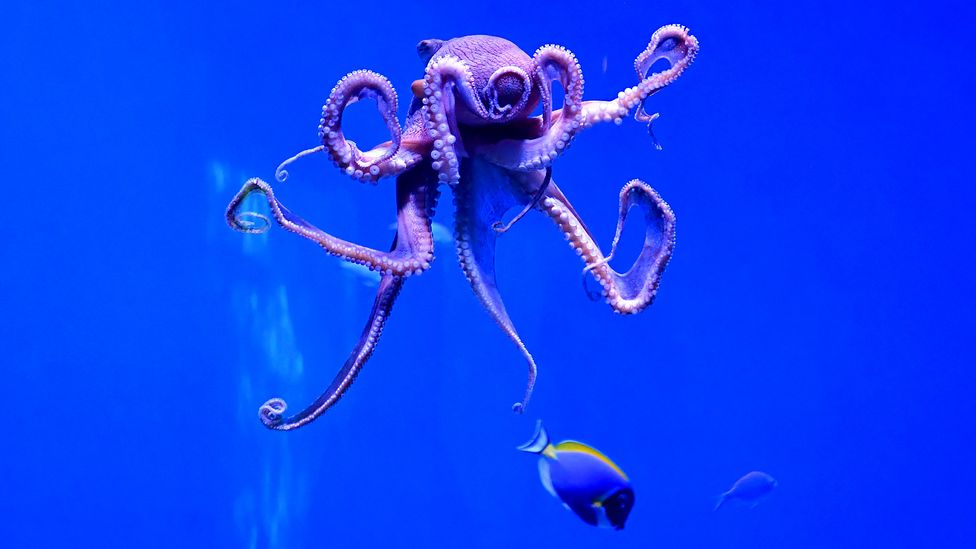
It's a question that is becoming more urgent. The multinational seafood firm Nueva Pescanova is currently seeking licenses to open the world's first commercial octopus farm in the Canary Islands. The announcement has raised objections from animal welfare activists that it is not ethical to farm such intelligent and possibly sentient animals. As one essay puts it: "When the question of animal consciousness is under consideration, our guilt or innocence as a civilization for an enormous body of cruelty may hang in the balance."
Nueva Pescanova told BBC Future that the firm is carrying out research into the "cognitive and neurophysiological mechanisms of the octopus", and that its aquaculture conditions allow the firm "to objectively improve the octopus welfare". Nueva Pescanova says its aquaculture conditions will mimic the natural habitat of the octopus in the wild. "It is a novel system that is giving excellent results in terms of growth, survival and endowment of the specimens," a spokesperson for the firm says.
